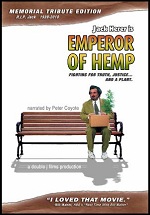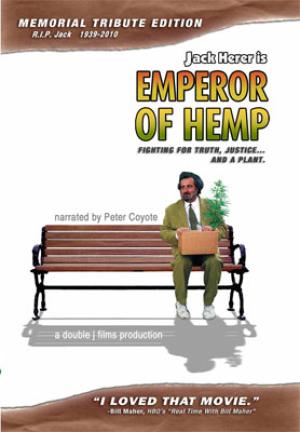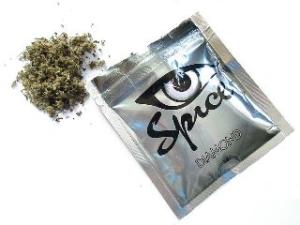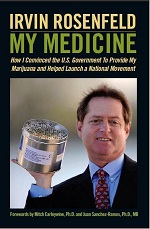Last week we wrote you to explain some of the reasons we at StoptheDrugWar.org believe a brighter future beyond prohibition is ahead of us. But we need your help to make that brighter future happen. Donate and you can receive up to three new membership premiums we are offering that reflect the optimism of this special time.
Portugal's policy of decriminalizing the use and possession of all drugs is winning well-deserved praise, but decriminalization is only a halfway step to ending drug prohibition, not the end of the road for reform, European activists say.
Chomping at the bit to get into the medical marijuana business in Arizona? There's a forum in Phoenix you might want to attend.
We review a memorial tribute edition of "Jack Herer is the Emperor of Hemp" that includes never seen interviews with Herer and the entire 1943 USDA film "Hemp for Victory." It is most worthy.
Sticky-fingered law enforcement seems to be the theme this week.
Will Ciudad Juarez reach a death toll of 3,000 this year? It will if December is like November was.
Synthetic marijuana products sold as incense or potpourri under brand names like K2 and Spice have been banned in an emergency move by the DEA. You have 30 days before the ban takes effect.
It only took three weeks from Election Day, but California medical marijuana foe and Republican attorney general candidate Steve Cooley has finally conceded defeat to Democrat Kamala Harris.
An American music icon is calling for a political party devoted to marijuana legalization after his third pot bust in five years.
Like Dracula arising from his grave, the Canadian Conservatives' mandatory minimum crime bill is back. It just passed the Senate and now heads for the House of Commons.
Half of all Canadians continue to want to free the weed, but strangely enough, almost two-thirds favor mandatory minimums for growing as few as five pot plants. That last finding may be an artifact, though.
In early preparations for the World Cup and the Olympics, authorities in Rio de Janeiro are trying to run the drug gangs out of the shantytowns. The drug gangs aren't going without a fight.
Events and quotes of note from this week's drug policy events of years past.
Dear friend of drug policy reform:
| |  |
| |
Last week I wrote you to explain some of the reasons we at StoptheDrugWar.org believe a brighter future beyond prohibition is ahead of us. I talked about how encouraged we are by California's Prop 19 marijuana legalization initiative -- the positive media coverage ... the new, mainstream allies it brought in to the movement ... the relative closeness of the vote in a year that favored conservative election turnout. Despite the initiative not passing this time, we believe our time will be here soon.
I also talked about the phenomenal success that our newly-redesigned web site has had in its first few months. The improved site, our more up-to-the-minute publishing, and the excitement of Prop 19, all combined to bring more than half a million people to StoptheDrugWar.org during the weeks leading up to the election. We are taking the anti-prohibitionist message to more people than ever.
Would you please consider sending a donation to help us keep the message going?
| |  |
| |
We are pleased to offer three new membership premium gifts, reflecting our optimism for the future:
- Cannabinomics: The Marijuana Policy Tipping Point, book by Dr. Christopher Glenn Fichtner, points the way to a brighter future beyond the current drug war. (A Chronicle book review of Cannabinomics is coming out this week.)
- Emperor of Hemp, a re-released memorial tribute edition of the classic video, honors the movement pioneer Jack Herer whose efforts enabled much more to follow. (See our review of Emperor of Hemp here.)
- My Medicine, by Irv Rosenfeld, tells his story as one of now only four patients in the federal government's medical marijuana program, and chronicles the history of medical marijuana as it's unfolded in the US to its incredible place today.
Donate $15 or more for Emperor of Hemp, $35 or more for Cannabinomics or My Medicine, $45 for the video and either book, $60 for both books, or $75 or more to get all three.
Resources are tight in the drug policy reform movement right now, despite the excitement of the election. At StoptheDrugWar.org we have therefore focused our efforts on the work that we're the best at -- high-quality, journalistic level, original publishing about the drug war; and using our web site and email list to grow and support the entire drug reform movement -- Prop 19, sentencing reform, medical marijuana in the many states, everything.
We have made huge strides, and reform activists from the rank-and-file up through the leadership tell us what a difference our work makes for them.
But because the economy and funding situation is what it is, we need your help as this special year draws to a close -- please make a generous donation supporting StoptheDrugWar.org today.
Sincerely,
David Borden, Executive Director
StoptheDrugWar.org
Washington, DC
http://stopthedrugwar.org
P.S. We are grateful for your donation, whether it's large or small -- believe me, even the small ones add up to make a difference!
P.P.S. If you'd rather donate by check, select the "mail-a-check" option in our donation form, or send a check payable to DRCNet Foundation (tax-deductible for our educational work) or Drug Reform Coordination Network (non-deductible, supports our lobbying work) to P.O. Box 18402, Washington, DC 20036.
back to top
The Portuguese government has garnered well-earned plaudits for its nine-year-old policy of the decriminalization of drug possession, first last year from Glenn Greenwald in a White Paper commissioned by the Cato Institute, and just last month in a new academic study in the British Journal of Criminology. But while they applaud the Portuguese government for embracing decriminalization, some drug user advocates there are saying there is more to be done.

Lisbon, capital of Portugal
Portugal broke new ground back in July 2001 when it decriminalized the possession of up to a 10-day supply of all illicit drugs. Under the new policy, drug users caught with drugs are not arrested, but are instead referred to regional "committees for the dissuasion of addiction." Those committees are empowered to impose warnings or administrative penalties, including fines, restrictions on driving, and referral to treatment.
But in most cases, the committees simply suspend the proceedings, meaning that, in effect, no punishment is meted out. The decriminalization policy has been accompanied by increased investment in treatment and harm reduction services, including methadone maintenance for people addicted to heroin.
As Greenwald found last year, and researchers Dr. Caitlin Hughes and Professor Alex Stevens last month, decriminalization is working. Hughes and Stevens found that while there had been a modest increase in drug use by adults, it was in line with increases reported by other southern European countries.
While drug use increased modestly, Hughes and Stevens were able to report that the harms associated with drug use had decreased under decriminalization. They found a reduction in the rate of spread of HIV/AIDS, a reduction in drug-related deaths, and a reduction in drug use by adolescents. They also found that drug seizures had increased under decriminalization.
"Contrary to predictions, the Portuguese decriminalization did not lead to major increases in drug use," the researchers concluded. "Indeed, evidence indicates reductions in problematic use, drug-related harms and criminal justice overcrowding.”
For Hughes and Stevens, the Portuguese experiment was also significant because it showed that decriminalization reduces harm for all drugs, not just marijuana. "Such effects can be observed when decriminalizing all drugs," they wrote. "This is important, as decriminalization is commonly restricted to cannabis alone."
Speaking in New York last week, Stevens elaborated: "The evidence from Portugal suggests that we could end the criminalization of users of all types of drugs -- and not just marijuana -- without increasing drug use and harms. It also shows the importance of continued investment in treatment services and harm reduction to reduce drug-related deaths and HIV."
But while Portugal's decriminalization is gathering praise from abroad, the view from the ground is a bit more nuanced. Decriminalization has improved the lives of drug users, but much remains to be done, said Jorge Roque, a Portuguese attorney who works with the
European Coalition for Just and Effective Drug Policies (ENCOD), the
International Network of People Who Use Drugs (INPUD), and the Portuguese group Diferenca Real, which attempts to improve conditions for drug users there.
"Decriminalization allowed drug users to stop being persecuted by the police and helped many of them realize they are not criminals simply because they chose to use drugs," said Roque. "And many people are now receiving help from the drug attendance centers," where addicted drug users may be sent after being caught. "Many drug users are trying hard to stay within the law, because if one isn't a criminal just for using drugs and one can pay for his drugs through his job, he doesn't want to be identified as a criminal, which was impossible before decriminalization."
Decriminalization has also led to changes in policing, said Roque. "After some time, the police shifted from arresting drug users to going after small-time dealers," he noted. "The police realized that arresting the small-timers is the best way to catch the big sharks," he said, alluding to the continuing black market drug trade. "The black market remains. Decriminalization didn't stop that," Roque said.
"The majority of drug-related crime wasn't caused by using a drug," the attorney continued, "but by committing an offense to buy drugs. Decriminalization is an important step, but it is only a step. Drug distribution is still forbidden in Portugal, and that means traffickers have a monopoly on the drug supply, and as a result, the prices are very high. So many people commit small thefts to buy their drugs, and the police try to control them and the drug neighborhoods with all the usual abuses."
The Portuguese government should not be sitting on its laurels, Roque said. While it deserves praise for what it has done, it has not done enough, he said.
"We are completely happy that the government decriminalized drug use, but the drug situation is very complex and touches on many different aspects -- legal, political, health, social, economic, morality -- and we have some demands that we think the government is not addressing because it is satisfied with what it has done with decriminalization," said Roque.
That point was echoed by Joep Oomen, head of ENCOD. If the Portuguese government stops with just decriminalization, it will be just as hypocritical as any other government, he said.
"By decriminalizing the use and possession of small quantities of illegal drugs, Portugal has reduced the immediate damage of drug prohibition," Oomen said. "The police don't persecute users and petty dealers as much, and problematic users find their way to health services. But decriminalization has not solved the main problem of prohibition: Drugs continue to be distributed by traffickers who inflate the price, impose criminal marketing methods, and have minimal concern for product quality or the safety of consumers. If Portuguese authorities do not take the next step toward legal regulation of the market, their policies will remain as hypocritical as those of any other country," he said.
But that's unlikely any time in the near future, said Roque. Even other drug reforms this side of ending prohibition are now stalled, he said.
"After all the international news reporting on the success of decriminalization in Portugal, the politicians' egos are so big they think they don't need to do anything else," said Roque. "But many drug users want to see safe injection sites, heroin maintenance programs, and the like, instead of just decriminalizing use. Similarly, the cannabis reform bill is still stuck in parliament waiting for approval. The government says it is busy with the international financial crisis and now our own public deficit, and can't do anything, even though this could mean revenues for the government."
With its drug decriminalization policy, Portugal has indeed become a beacon to the world, a model of progressive drug reform that could and should be emulated elsewhere. But as Roque and Oomen make clear, decriminalization is only half the battle.
back to top
Voters in Arizona last month passed Proposition 203, an initiative that makes Arizona the 15th state to approve medical marijuana. State officials now have a little more than three months to come up with rules and regulations to implement the program, but budding medical marijuana entrepreneurs are not just twiddling their thumbs in the meantime.
With equal measures of enthusiasm and apprehension, would-be cannabis businesspeople are looking to cash in. The Arizona law allows for dispensaries -- as many as 124 of them statewide -- as well as off-site medical marijuana grow ops, but with the rules and regulations just being written, just how the dispensaries and grow-ops will be regulated is unclear at this point.
While businesspeople are eager to start serving the community and making money, they also worry about their investments. They look to states like California and Colorado, which also allow for dispensaries, but which have also seen significant blowback from communities that have felt overwhelmed -- Los Angeles, for example, where the city council responded to the nearly a thousand dispensaries that popped up in the area by cutting their numbers back dramatically.
The
Marijuana Policy Project (MPP) is reporting that its phones are ringing off the hook with calls from people wanting to know how to go about setting up businesses that cater to the medical marijuana community. And MPP executive director Rob Kampia told the Chronicle the group is responding with a December 13 evening forum on the medical marijuana business in Phoenix.
"We've been getting lots of phone calls and emails from people in Arizona, as well as places like Colorado, who want to know all about this new law we just passed," Kampia explained. "These are entrepreneurs who smell opportunity and want a crash course on what the law would do and what the prospects are that the health department or city councils might mess with it. When a bunch of people are contacting you asking for guidance, you can either blow them off or you can field each call individually and have your organization come to a screaming halt. We chose a third alternative."
That would be the December 13 forum. In true entrepreneurial spirit, MPP will charge the would-be cannabis businesses $300 per individual or $500 for two people. A web site for the forum will be up shortly, but in the meantime, people who are interesting in attending should send an email to
[email protected].
"This will be a money-maker for MPP," said Kampia. "We'll use the money for lobbying efforts in Arizona and elsewhere."
But of course, it's not just a money-maker. "It's about educating the community," Kampia said. "One byproduct of education is that people will be less likely to creatively interpret the law."
That has been a problem in non-dispensary states, such as Montana and Michigan, where the cutting edge of medical marijuana entrepreneurship is bumping up against hostile state and local governments and recalcitrant law enforcement officials. Similarly, in California, where dispensaries are not licensed by the state, dispensaries face restrictions and even bans from local governments. Even in Colorado, which, like Arizona, features state licensing of dispensaries, conflicts have arisen.
"We will be giving words of warning at the forum, particularly about Michigan and Montana," said Kampia. "In Michigan, there are people who think the law allows for the unlimited operation of dispensaries, and as a result, the legislature will try to roll back the law. In Montana, you have that traveling circus giving group physician recommendations to patients, and that's causing similar backlash in the state legislature. There are already bills pre-filed to rollback or repeal the Montana law."
Some of the messages the forum will put out may seem obvious, but they aren't so obvious that somebody somewhere hasn’t gotten into trouble for not heeding them. "Don't put on a traveling road show, don't open a dispensary without a permit, don't do inappropriate advertising," Kampia ticked off in rapid-fire order.
Kampia will be at the forum in Phoenix to discuss the relationship between federal law and Prop 203. He will be joined by MPP's Karen O'Keefe, who co-authored the newly-passed initiative;
Sensible Colorado's Brian Vicente, who will explain how dispensaries work in Colorado, and a representative of the Phoenix consulting firm that worked with MPP to pass the law, who will discuss how Arizona law will change and how state and local authorities might respond.
Medical marijuana as a business opportunity may seem crass to a sizeable segment of the community, but that is the American way. If people don't think sick people should have to pay for their medicine, that's a defensible position, but in the meanwhile it is probably unfair to expect medical marijuana providers to be the only ones not getting paid.
back to top
"Jack Herer is the Emperor of Hemp," Memorial Tribute Edition (2010, Double J Films, $19.95)
(Order this and other new membership premiums by donating to StoptheDrugWar.org.)
Jack Herer, author of "The Emperor Wears No Clothes," and arguably "the greatest cannabis crusader of all time," died in April after suffering a heart attack at the Portland Hempstalk Festival eight months earlier. The passing of the movement icon prompted the release of this memorial tribute edition of "Jack Herer is the Emperor of Hemp," which updates the decade-old release with new interview footage with the prophet of hemp and includes the entire 1943 Department of Agriculture film "Hemp for Victory."

But it's not just the new, never before seen interview material that makes this DVD reissue worthwhile, because Jack Herer's story is fascinating in itself and "Jack Herer" does an admirable job of explicating the man, his evolution, and his passions. (Not to mention you'll get to see NORML founder Keith Stroup before his hair turned white!)
Herer's story is a true American journey (and by the way, it's pronounced HAIR-er, not Huh-RARE). Born in 1939, Herer entered the 1960s as a conservative -- an Army veteran and Goldwater supporter, married and living in California's Central Valley, who was offended by the upheavals of the time, disgusted by anti-war protestors, and blamed much of the upheaval on the demon weed. Who knew?
By the following decade, things had changed dramatically. Divorced, Herer's new girlfriend persuaded him to try marijuana. Here, the DVD shows a dancing girl as Norman Greenbaum's "Spirit in the Sky" booms out on the soundtrack, an apt evocation of Herer's transformation from military policeman to hippie, from Goldwater Republican to radical.
With Emmy Award winner Peter Coyote narrating, and with archival footage and interviews from the likes of NORML's Keith Stroup, historian Michael Aldrich, Kevin Zeese, and Dr. John Morgan, "Jack Herer" tracks Herer's odyssey from author of a 1973 marijuana cartoon book to his subsequent experience as recipient of knowledge from innumerable people about not just pot, but hemp, and all its uses, his opening of the first hemp store on Venice Beach in 1979, and ultimately the publication of the book that made him famous and re-energized the marijuana legalization movement, "The Emperor Wears No Clothes."
The DVD acknowledges the early conflicts between Herer and the drug reform movement, which at first considered him at best an over-enthusiastic partisan and at worst a crank. Herer thought hemp could be central to ending marijuana prohibition, not to mention that it could "save the world," and the be-suited boys back East weren't buying what that wild-eyed, tie-dyed, missionary Californian was selling.
A number of years later, the movement types were suitable contrite. "He overstated the case a bit," said Stroup. "We were embarrassed; we thought it could undermine our credibility."
Instead Herer almost singlehandedly revitalized the pot movement with the 1985 publication of "The Emperor Wears No Clothes," the magnum opus of hemp, and an intoxicating combination of unknown history, polemics, and passion that turned a new generation on not just to hemp, but to pot, the history of its criminalization, and the need to undo prohibition.
"Jack Herer" describes the tenets of "The Emperor Wears No Clothes" fairly without wholeheartedly endorsing his theory of an evil troika of Harry Anslinger, the Dupont family, and Andrew Mellon conspiring to bring on prohibition. And I think that's fair. Herer's conspirators most certainly played a role in pot prohibition, but the anti-marijuana movement was alive and well in this country well before Anslinger and the others were active in the 1930s.
Maybe hemp won't "save the world," but there is no arguing that it is a tremendously valuable plant with a multitude of uses that can help improve the environment, create jobs, and provide us with everything from biodiesel to body panels to an ever-increasing variety of hemp-based foods.
And Herer's perhaps overenthusiastic message was received enthusiastically by that new generation, especially when tied to his never-forgotten broader campaign to legalize marijuana, beginning with initiative campaigns back in the 1970s. Between bringing hemp to the forefront and energizing a movement suffering through the depths of the Reagan Era, Herer cemented his place in movement history.
But he didn't stop there. In fact, he didn't stop until he fell over unconscious at a movement event just after giving one last speech. Herer was a movement presence throughout the 1990s, and by then, had won the acceptance of the movement, which recognized the enormous contribution he had made. Despite a 2001 stroke that laid him low, he bounced back, still out proselytizing and organizing, even as he moved slowly and struggled to control his voice.
In California, at least, every marijuana movement figure of a certain age knew Jack Herer. Whether from his days as the hemp hawker of Venice Beach or the decades of activism that followed, Herer has made a lasting impact on California's -- and indeed, the country's -- marijuana legalization movement. "Jack Herer is the Emperor of Hemp" pays fond homage to a true movement hero. It is definitely worth checking out, especially as you ponder the man, his life's work, and his impact on the marijuana reform movement.
(Order this and other new membership premiums by donating to StoptheDrugWar.org.)back to top
Sticky-fingered law enforcement seems to be the theme this week. Let's get to it:
In Maywood, Illinois, a
Maywood police officer was charged November 24 with stealing cash from suspects after being snared in a federal sting operation. Officer Robert Welch, a tactical officer focused on suppressing gang activity, went down after the mother of an African-American youth he had stopped and frisked complained that he stole $20 from the boy. In the subsequent sting, Welch stole $240 from an undercover FBI agent he had detained as a drug suspect. He admitted ripping off other suspects, usually drug suspects, for the past six months. He is on administrative leave.
In San Antonio, Texas,
two former Bexar County narcotics detectives were indicted November 24 on charges related to their work on the Bexar County Narcotics Unit. Deputy Charles Flores was indicted on five counts, including theft by a public servant $1,500 to $20,000, misapplication by a fiduciary, and aggravated perjury. Deputy Anthony Alvarado was indicted on four counts, including theft by public servant $1,500 to $20,000; misapplication by a fiduciary and abuse of official capacity. Aggravated perjury and theft by public servants are both third-degree felonies, punishable by two to 10 years in prison. The other charges are state jail felonies, punishable by up to two years in state jail.
In Los Angeles,
a state narcotics agent was arrested November 16 on charges he stole money from drug suspects. California Department of Justice Bureau of Narcotics Agent Gabriel Baltodano, 35, went down in a sting in which he stole $33,000 from an undercover agent. He came under internal investigation after fellow agents were "alerted to the possibility" he was stealing cash from drug suspects. He is charged with grand theft and embezzlement and is looking at up to four years in state prison. His bail was set at $125,000.
back to top
by Bernd Debusmann, Jr.
Mexican drug trafficking organizations make billions each year smuggling drugs into the United States, profiting enormously from the prohibitionist drug policies of the US government. Since Mexican president Felipe Calderon took office in December 2006 and called the armed forces into the fight against the so-called cartels, prohibition-related violence has killed more than 30,000 people, including more than 9,000 this year. The increasing militarization of the drug war and the arrest of dozens of high-profile drug traffickers have failed to stem the flow of drugs -- or the violence -- whatsoever. The Merida initiative, which provides $1.4 billion over three years for the US to assist the Mexican government with training, equipment and intelligence, has so far failed to make a difference. Here are a few of the latest developments in Mexico's drug war:

just another drug smuggling tunnel -- how many more?
In Tijuana,
the Mayor-Elect said he will replace police chiefJulian Leyzaola. Leyzaola, who took office in December 2008, was widely praised by the US and Mexican governments for his efforts to root out corruption in city police forces and for his efforts against cartels. Leyzaola has also been accused of police brutality and human rights abuses, and the state human rights ombudsman has said that Leyzaola personally participated in beatings of suspects accused of killings police officers. Several officers accused of corruption have said they were tortured by men under Leyzaola's command.
On the border between Tijuana and San Diego,
authorities discovered a half-mile tunnel and seized some 20 tons of marijuana. It is the second such discovery in the past month. Eight people were arrested, three of them on the American side of the border.
Saturday, November 27
In Ciudad Juarez,
police arrested a leader of the Aztecas gang who stands accused of being a key player in the violence in the city. Arturo Gallegos, 32, aka "El Farmero" is accused of being involved in 80% of the killings that have taken place in the city since August, including the murder of two US consulate employees, the murder of five federal police officers, and the massacre of 14 students at a house party. He is also suspected of being involved in drug trafficking, kidnapping, and extortion. The Aztecas gang works for La Linea, the armed wing of the Juarez Cartel.
Monday, November 29
In Palomas, Chihuahua,
20 bodies were discovered buried at a ranch. Soldiers discovered the site after being tipped off by several recently captured cartel members. Mexican news sources later reported that at least one of the dead had been identified as a US citizen.
In Meoqui, Chihuahua, a female police chief was gunned down. Hermila Garcia, 36, was ambushed by gunmen as she drove through the center of town. Several women have taken police chief positions in northern Mexico recently, as many potential male candidates are frightened that they will be assassinated.
Tuesday, November 30
In Michoacan,
police arrested a suspected leader of La Familia Michoacana. Jose Alfredo Landa, 37, was thought to be in charge of LFM operations in the city of Morelia. Three other individuals were arrested and an AK-47 was seized, along with more than two dozen property titles and other documents that had come from various extortion plots he was involved in.
In Ciudad Juarez,
ten people were murdered in several incidents in the city. This brings the monthly death toll to approximately 194 for the November, making it the second least violent month of 2010. According to El Diario, a local newspaper, 2,887 people have been murdered in Ciudad Juarez in 2010 as of December 1.
Total Body Count for the Week: 167
Total Body Count for the Year: 9,405
Read the previous Mexico Drug War Update here.back to top
The US Drug Enforcement Administration (DEA) announced Wednesday that it is issuing an emergency ban on five chemicals used to make synthetic marijuana products. The ban will go into effect in 30 days and will at least temporarily place the chemicals on Schedule I of the Controlled Substances Act.

Banned in 30 days (Image courtesy Wikimedia)
Marketed as incense and sold under names including Spice and K2, the stuff has grown increasingly popular since it first appeared on store shelves around two years ago. Spurred on by prohibitionist reflex, as well as reports of emergency room visits and calls to poison centers, 15 states have already banned synthetic pot products. Similar legislation is pending in several more. Last week, powerful Sen. Orrin Hatch (R-UT) wrote
a letter to the DEA seeking a federal ban.
The ban announced Wednesday is temporary and will be in effect for one year, with the possibility of a six-month extension. During that period, DEA and the Department of Health and Human Services will decide whether the substances should be permanently controlled.
“The American public looks to the DEA to protect its children and communities from those who would exploit them for their own gain,” said DEA Acting Administrator Michele Leonhart. “Makers of these harmful products mislead their customers into thinking that ‘fake pot’ is a harmless alternative to illegal drugs, but that is not the case. Today’s action will call further attention to the risks of ingesting unknown compounds and will hopefully take away any incentive to try these products.”
The
Drug Policy Alliance (DPA) was quick to criticize the DEA's move. "The DEA says that prohibiting synthetic marijuana will 'control' it – yet we know from history that prohibition is the complete opposite of drug control," said DPA spokesman Tony Newman in a Wednesday press release. "DPA is advocating for establishing regulatory restrictions, such as age limits and product labeling requirements, rather than banning it outright and relegating it to the black market."
Despite approximately 2,000 poison control center contacts from synthetic pot users complaining of a variety of symptoms including nausea, rapid heartbeat, and disorientation, DPA noted that there are no known cases of fatal synthetic pot overdoses and that there is no evidence the stuff is addictive.
"Scheduling [synthetic marijuana] as a controlled substance will have unintended detrimental consequences," DPA warned. "If K2 were banned outright, young adults could face immediate, devastating and life-long legal barriers to education, employment, voting and government benefits for K2-related drug law violations, despite a lack of evidence of harm to themselves or others. The use of scarce government funds to enforce, prosecute and incarcerate people who use K2 would put a strain on criminal justice resources."
back to top
Los Angeles County prosecutor Steve Cooley has conceded victory to San Francisco County prosecutor Kamala Harris in the race for California attorney general. Cooley had led on election day, but Harris moved ahead during the late vote count and, according to California secretary of state's office, now leads 46.0% to 45.5%. Although the results are not yet official, Harris leads by 54,000 votes with only a few tens of thousands left to count.

California's next attorney general, Kamala Harris (Wikimedia)
Cooley was strongly opposed by medical marijuana supporters because of his record as LA county prosecutor. He condoned dozens of SWAT-style raids on dispensaries, collaborated with the DEA, aggressively prosecuted patients and providers, and argued that any medical marijuana sales by dispensaries were illegal. He was backed by the California Narcotics Officers Association, which has called for the "eradication" of dispensaries.
Harris, on the other hand, has consistently supported the state medical marijuana laws. As San Francisco prosecutor, she also oversaw one of the first dispensary regulation ordinances in the country.
"A defeat for Steve Cooley is a tremendous victory for patients," said Steph Sherer, executive director of
Americans for Safe Access. "Not only will we have an ally in Kamala Harris to be able to advance civil rights protections for patients, but we have also shown that medical marijuana advocates are a powerful political force. This race shows that medical marijuana patients cannot be marginalized without a political consequence," Sherer concluded.
back to top
After his third pot possession bust in five years, country music legend Willie Nelson has had enough. He told former High Times editor Steve Bloom's CelebStoner web site Sunday it is time for a new, pro-marijuana political party.

Free Willie? Free the weed! (image from Wikimedia)
"There's the Tea Party. How about the Teapot Party? Our motto: We lean a little to the left," Nelson said. "Tax it, regulate it and legalize it, and stop the border wars over drugs. Why should the drug lords make all the money? Thousands of lives will be saved."
A
Willie Nelson's Teapot Party Facebook page went online Sunday, as well.
Nelson was arrested Friday at a border checkpoint in Sierra Blanca, Texas, on Friday after officials smelled marijuana. They searched the vehicle with drug-sniffing dogs and found six ounces of pot. Nelson was arrested and jailed until he posted a $2,500 bond later that afternoon.
Nelson's arrest was just one of what are likely to be around 900,000 pot busts this year, the vast majority for simple possession. Last year, more than 850,000 people were arrested for marijuana offenses.
Despite a raft of recent polls showing increasing support for marijuana legalization nationwide and majority support on the West Coast, the number of members of Congress showing any interest in moving toward marijuana legalization remains in the single digits OR can be counted on one hand. However, there have been
rumors of support in some influential Democratic circles for marijuana legalization as a get-out-the-vote strategy. Dozens of Democratic organizations in California lent their endorsement to this year's
Prop 19 ballot initiative, as did the Republican Liberty Caucus.
back to top
The Canadian Senate Friday passed the Conservative government's crime bill, S-10, which institutes mandatory minimum sentences for a number of non-violent drug offenses, including a six-month sentence for growing five pot plants. The bill now heads to the House of Commons for hearings and a vote.

Parliament House, Ottawa (Courtesy Wikicommons)
Last year, the bill passed the House, but had been watered down by a Senate amendment raising the bar for mandatory minimums to more than 200 plants. But the bill died before final passage when Prime Minister Steven Harper dissolved parliament.
This year, after elections strengthened the Conservatives' hand in the Senate, "the body of sober second thoughts" had no stomach for another fight over the bill, which was reintroduced this spring by Justice Minister Rob Nicholson. Liberal members of parliament counted heads and concluded they couldn't pass the amendment again. Another amendment that would have had the mandatory minimums kick in at 20 plants was defeated earlier.
The bill would impose six-month mandatory minimums for growing five or more plants with the intent to sell and one-year minimums when marijuana dealing is linked to organized crime or a weapon is used. The bill would also impose mandatory minimum one-year sentences for dealing hard drugs when linked to organized crime or weapons and two-year sentences for dealing hard drugs to minors or near a school or other place where young people congregate.
"The bill is a disaster for Canada," said Jacob Hunter of
WhyProhibition.ca. "S-10 will imprison thousands of Canadians for victimless crimes, send people to jail for growing 6 marijuana plants, making any hashish or baked goods, and a host of other offenses. There is no evidence that S-10 will work," Hunter said. "Indeed, every scientific study says it will fail. We know that prohibition has never worked, and we know that mandatory minimum sentences only increase the violence in our society."
Activists in Canada are working with opposition parliamentarians in the House of Commons to try to block it there. Stay tuned.
back to top
Exactly 50% of Canadians support legalizing marijuana, according to poll results released Monday by Angus-Reid Public Opinion. Some 44% oppose legalization, with 6% undecided.
Support for legalization has declined slightly when compared to Angus-Reid polls in 2008 and earlier this year. In both those polls, support for legalization was at 53%. But the difference is within the poll's +/- 3.1% margin of error.
Support for pot legalization was highest in Manitoba and Saskatechewan (61%), British Columbia (54%), and Ontario (51%). Support was weakest in Alberta (45%).
The poll also asked about support for legalizing drugs other than marijuana. In no case was support for legalizing hard drugs higher than 10%.
The poll also queried respondents on whether Canada has a "drug problem" and how serious it is, as well as their positions on several drug policy-related government proposals. Slightly more than a third (37%) thought Canada has a drug abuse problem that affects the whole country, while 41% thought the drug abuse problem was reserved for "specific areas and people." Only 11% thought Canada did not have a serious drug problem, and 10% had no opinion or didn't know.
When it came to policies, there was strong (81%) support for a National Anti-Drug Strategy, including a national youth awareness campaign to keep kids off drugs. But the Conservative government's push against harm reduction measures, such as needle exchanges and Vancouver's safe injection site was supported by only 35% of respondents and its scrapping of the previous Liberal government's pot decriminalization proposal was supported by only 33%.
But somewhat paradoxically, while half of Canadians support pot legalization and nearly as many (47%) support the Liberal decriminalization plan, nearly two-thirds (64%) support the Conservatives' bill to impose mandatory minimum sentences on people growing as few as five pot plants, as well as people convicting of selling other drugs. That number may, however, be an artifact resulting from the question design, which conflated "marijuana grow operators" and "drug dealers."
It appears that marijuana is indeed related to schizophrenia--at least in the Canadian political psyche.
back to top
A week of fighting between authorities and drug-trafficking groups in Rio de Janeiro has left dozens of people dead and two favelas, or shantytowns, occupied by heavily armed military police. Those favelas had for years been bases for the Red Command, one of the more powerful of the gangs.

Favela in Rio de Janeiro (Image courtesy Wikicommons)
The violence broke out a week ago when the drug gangs responded to an increased police presence in the favelas by attacking police patrols and burning buses. Nearly a hundred vehicles have been reported burned, and
the death toll as of Sunday morning was at least 35.
After more than 2,600 heavily armed military police backed by armored personnel carriers and at least five helicopters, swept into the Alemao favela complex, the
death toll as of Sunday night was at least 50. Red Command gunmen had retreated there after troops drove them from another favela, Villa Cruzeiro, earlier in the week.
While authorities reported at least 174 arrests, hundreds of other Red Command gunmen are believed to escaped through the labyrinthine passageways of the favelas. Authorities also reported seizing hundreds of weapons and several tons of marijuana.
The clashes come as Rio begins a campaign to integrate the favelas into the fabric of city life in preparation for the World Cup soccer tournament in 2014 and the summer Olympics in 2016. The favelas and their residents have historically been ignored by the Brazilian state, leaving a power vacuum that the drug gangs have filled in a number of them. But now the state is interested in establishing governance in them, and the commands are not going without a fight.
The military said it will occupy Alemao and Villa Cruzeiro as long as necessary. That has not been the pattern in the past, where occasional police sweeps and occupations have changed things temporarily, but have not had the staying power to change things permanently.
back to top
December 5, 1933: The passage of the 21st Amendment repeals prohibition of alcohol. Prohibition ends a little after 5:00pm EST when Utah becomes the 36th state to ratify the amendment.
December 2, 1993: Notorious drug lord Pablo Escobar is hunted down and killed by Colombian police making use of US technology. At his funeral days later, tens of thousands of Medellin residents come out to mourn him.
December 3, 1998: Colombian police seize about seven tons of cocaine in Cartagena, Colombia, destined for the US via Cuba.
November 30, 2000: The DEA announces that it intends to prohibit hemp products, including shampoo, soap, and food made from non-psychoactive hemp seeds. (DEA loses this one.)
December 1, 2000: President of Uruguay Jorge Batlle is quoted in El Observador suggesting legalization of drugs.
December 6, 2000: Belgium's parliament decriminalizes possession, consumption and trade in up to five grams of marijuana or hashish.
November 30, 2001: The Austin Chronicle calls John Walters, the new US drug czar, "the Dr. Strangelove of our country's absurd drug war -- he dismisses anyone who says our nation's prisons are too full, he favors longer jail sentences for marijuana users, he has declared that there's too much 'treatment capacity' in the US, he opposes efforts to address the racial discrepancies in drug enforcement, he wants more militarization of the drug war at home and abroad, he'd like to see an expansion of our government's war in Colombia, and he's been a noisy opponent of state initiatives to allow the medical use of marijuana."
December 4, 2001: Canada's Auditor General releases a report on the federal government's role in dealing with illicit drugs. Part of the report reads: "Eleven federal departments and agencies are involved in the effort to control illicit drugs at a cost of about $500 million a year... But they don't know the extent of the problem and whether or not they are succeeding in their efforts."
December 2, 2002: Reuters reports that an independent study concluded marijuana use does not lead teenagers to experiment with hard drugs like heroin or cocaine. The study by the private, nonprofit RAND Drug Policy Research Center countered the theory that marijuana acts as a so-called gateway drug to more harmful narcotics, a key argument prohibitionists use against legalizing marijuana in the United States.
back to top













